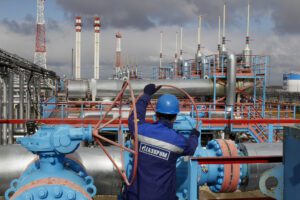
Ukraine’s Gas Transmission System Operator (GTSOU) has accepted a request from Gazprom for Monday to transport 40.1 million cubic meters of gas through the country, virtually unchanged from 40.4 mcm on Sunday, data from GTSOU show. Capacity was requested only through one of two entry points into Ukraine’s Gas Transmission System, the Sudzha metering station. A request was not accepted through the Sokhranivka metering station.
“Gazprom is supplying Russian gas for transit through the territory of Ukraine at the volume confirmed by the Ukraine side via the Sudzha metering station at 40.1 million cubic meters on June 6, with no booking via the Sokhranivka metering station ” Gazprom spokesman Sergei Kupriyanov told reporters.
GTSOU has declared a force majeure in regard to accepting gas for transit through Sokhranivka, citing the fact that it cannot control the Novopskov compressor station.
Gazprom believes there are no grounds for a force majeure or obstacles to continuing to operations as usual. Ukrainian specialists worked smoothly at the Sokhranivka and Novopskov stations all this time and continue to do so; transit through Sokhranivka was ensured in full, and there were and are no complaints from counterparties, the Russian gas giant has said.

Gas Transport System Operator of Ukraine (GTSOU) has accepted a request from Gazprom for Wednesday to transport 53.9 million cubic meters of gas through the country, up from 48.8 mcm on Tuesday, data from GTSOU show.
The capacity was requested only through one of two entry points into Ukraine’s Gas Transmission System, the Sudzha metering station. A request was not being accepted through the Sokhranivka metering station.
“Gazprom is feeding Russian gas for transit through Ukraine’s territory in the amount confirmed by the Ukrainian side through the Sudzha gas metering station – 51.6 mcm for May 18. The request for the Sokhranivka gas metering station was declined,” Gazprom spokesman Sergei Kupriyanov told reporters.
GTSOU declared a force majeure in regard to accepting gas for transit through Sokhranivka, citing the fact that it cannot control the Novopskov compressor station.
Market
As prices decrease on the market, Europe’s liquefied natural gas (LNG) imports are beginning to fall somewhat in May from the record high of April, when the European gas transport system took in 10.651 billion cubic meters or 355 mcm per day from LNG terminals. As of the last reporting date, May 16, use of regasification capacity at European terminals was at 63%, which is far from the peak of 77% at the end of April.
The region is continuing to inject gas into underground gas storage (UGS) facilities, reserves in which now stand at 40.52%, up by 0.45 percentage points from a day earlier, data from Gas Infrastructure Europe show. Reserves in Europe’s UGS currently lag 3.5 percentage points behind the five-year average.
Injection into UGS in April was slowed by high prices for imported gas, but in May imports from Russia increased and the pace increased. In the first 16 days of May, the pace of gas injection into UGS exceeded the five-year average by 48%, compared to just 12% in April.
Europe imposed tight regulation of the use of UGS this year. Reserves are supposed to be at least 80% of UGS capacity by the start of the offtake season in 2022 and subsequently increase to 90%. However, European Union officials continue to oppose Russia’s new conditions for paying for gas. This could lead to the suspension of supplies to other countries as has already happened with Poland and Bulgaria, and makes it harder to fulfil this directive.
Wind power contributed almost 17% of electricity generation across the European Union in the week from May 9 to 15. The figure dropped to 12% in the first two days of the new week, data from WindEurope show.

Operations of the European gas industry are realigning with the changing season, with the warming spring temperatures in Europe and declining prices on the spot market resulting in importers reducing off-take of Russian gas.
According to the data of Gas Transmission System Operator of Ukraine, nomination for April 26 is 56 million cubic meters, and bookings for April 25 totaled 68.4 million cubic meters.
Rising temperatures and seasonally declining gas consumption allow importers to return to the flexible optimization of booking volumes from suppliers depending on the cost. Gas imported under a month-ahead contract – Gazprom has about half of its exports pegged to this contract – in April is around $1,400 per thousand cubic meters. A day-ahead contract on the spot market is currently $1,050 per thousand cubic meters. Therefore, buyers are increasing their purchases on the spot market, and reducing off-take on record-breaking long-term contracts.
Gas actually flowing via the Yamal-Europe pipeline between Germany and Poland has been continuously pumping in reverse mode since April 7. On Tuesday, the reverse flow of gas from Germany to Poland has dropped 66.7% to 200,000 cubic meters per hour, according to data from the Gascade gas transport operator. Off-take of additional volumes of gas from the main European hubs instead of direct imports from the east is another factor in the current high gas prices in the European Union.
Wind farms provided an average of 17% of the electricity generation in the European Union last week from April 18 to 24, with the figure falling to 9.5% on Monday, according to data from the WindEurope association.
Europe has begun injecting gas into its underground gas storage (UGS) facilities. The current stock level is 31.57%, an increase of 0.33 percentage points over the past day. The current stockpile in the UGS facilities in Europe is 6.3 percentage points behind the five-year average. High prices for imported gas have restrained injection in April.
According to the decree of the Russian president, the government as of April has introduced a new procedure for paying for Russian gas supplies that stipulates the obligatory conversion of the contract currency into rubles through Gazprombank.

Gazprom did not choose the capacity of the Polish section of the Yamal-Europe gas pipeline during the gas transmission capacity booking session for May, according to auction data on the GSA Platform booking platform.
89 million cubic meters were offered at the auction. m per day – all these capacities were not booked.
The Yamal-Europe gas pipeline, over 2,000 km long, can pump up to 33 billion cubic meters. m per year. The Polish 683 km section is owned by the EuRoPol Gaz joint venture and operated by the national gas transmission operator Gaz-System.
Gazprom’s long-term contract for transit through this country ended two years ago. Since then, its capacity has been allocated based on auction bookings.
At present Gazprom does not use the capacities of Yamal-Europe for deliveries to Germany. The pipeline transports Russian gas to Poland. Also, through it, the republic receives small volumes of this energy resource from Germany in reverse.
The gas transmission system operator of Ukraine did not offer additional capacities for the transit of Russian gas. In previous months, a solid capacity of 15 million cubic meters was set. m per day with the entrance through the gas measuring stations (GIS) “Sudzha” and “Sokhranovka”. For several months in a row, Gazprom did not book these capacities at auctions.
The Russian concern has a long-term reservation of Ukrainian capacities in the amount of 40 billion cubic meters. m is 109 million cubic meters. m per day.

The operator of the GTS of Ukraine (OGTSU) reports on gross interference by representatives of Russia and illegal armed groups controlled by them, the so-called. “LNR” in the operational work and technological processes of gas transportation through the compressor station (CS) “Novopskov” in the Luhansk region.
“The Novopskov CS is an important facility for organizing gas transportation to consumers in the Donetsk and Luhansk regions. Almost a third of the transit to Europe from the Sokhranivka gas measuring station (GIS) also passes through this station,” the OGTSU said on Friday.
According to it, a number of actions by the occupiers were recorded, providing for changes in the operation of communication equipment and technological modes, which in fact could lead to the loss of operational control over the CS equipment.
“This will lead to significant risks to the integrity of the gas transmission system, the stability of gas transportation regimes, and as a result, the impossibility of transporting gas through the CS, in particular, under a transit contract,” the GTS Operator of Ukraine explained.
The Ukrainian company called on the representatives of the aggressor to refrain from further pressure on its employees and interference in the work of the Constitutional Court.
“Otherwise, in case of loss of operational control, the OGTSU will be forced to stop the operation of this facility in order to maintain the integrity and safe operation of the GTS. Stopping the Novopskov CS means stopping transit through the Sokhranovka GIS. Responsibility for the consequences lies with the Russian Federation,” – emphasized in the message.
On April 6, OGTSU Director General Sergey Makogon said that since the beginning of the war unleashed by Russia, three main gas pipelines have been damaged, four compressor stations have been seized by the invaders, two gas distribution stations (GDS) have been destroyed, and another 48 GDS have been stopped.

Capacity utilization of Ukraine’s transit corridor on Friday remains at the same high level, in line with the long-term contract volumes of 40 billion cubic meters per year or 109 million cubic meters per day.
European buyers have increased nominations for Gazprom’s gas after prices soared due to the imposition of sanctions on Russia. Gas prices at the TTF hub were $1,383 per thousand cubic meters on Friday morning.
“Gazprom is supplying Russian gas for transit via Ukraine as scheduled in accordance with the requests of European consumers – 109.5 mcm on March 11,” the company’s official spokesperson Sergey Kupriyanov told reporters.
As confirmed by data from the Ukrainian GTS Operator, the nomination for March 11 is 109.4 mcm, while that for March 10 was also 109.4 mcm.